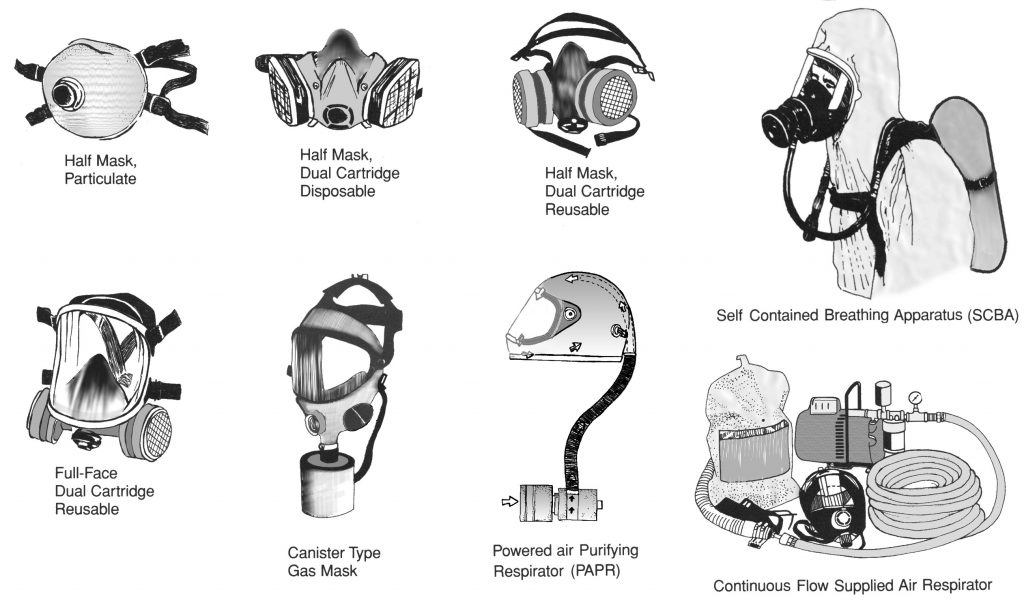Choosing a Respirator for Farm Work
By Tina Voigt, Maine AgrAbility Coordinator
How often do you think of masks and respirators? In farming, there are many situations when using a mask or respirator is essential to protect your lungs and your overall health. Respiratory hazards might involve:
- Dusts (which can cause or irritate Organic Dust Toxicity Syndrome, Farmer’s Lung Disease, Bronchitis, Asthma, Chronic Obstructive Pulmonary Disease (COPD))
- Gases
- Silo gas (NO2, Silo Filler’s lung)
- Manure (H2S, methane, CO, CO2)
- Welding fumes (NO2, Ozone, metal fumes)
- Pesticides
- Livestock & Poultry confinements
- Grain handling
- Using gas or diesel engine indoors (which you should never do unless you’re in an open or well-ventilated area)
- Paints and solvents
- Woodworking
Particulates (small particles of a harmful dust, gas, or pesticide) do not need to be seen to enter your respiratory system (from your nose and mouth to your lungs). In fact, particulates are incredibly small and can do significant damage. In some cases, particulates are so small your lungs cannot cough them out.
Before using any kind of respiratory protection, you should have a medical exam to make sure you are healthy enough to use one. Respirators, even a simple dust mask, can restrict regular breathing. If you have asthma, heart disease, claustrophobia, high blood pressure, lung disease, or are extremely sensitive to heat, you may not be okayed for respirator use.
- Make sure you have the right mask for the right job — each job may require a different mask.
Make sure you have the right fit for the mask; the mask should create a seal on your face. - Learn how to do a proper fit test.
- Make sure you have a variety of mask types available, and know how and when to use each type for the appropriate situations.
- Consider purchasing a protective equipment storage box (such as an airtight plastic container) — your respiratory protection equipment won’t help if it’s covered in dust it has collected form sitting in the barn.
A simple, one strap dust mask is NOT enough for most farm work — especially if you keep it hanging in your barn and re-use it! Different hazards require different types of respirators. Some respirators purify the air you breathe while others, that require power, supply clean air from a tank strapped to you. You should always use NIOSH (National Institute for Occupational Safety and Health) certified respirators. Find out more at the CDC website.
Once you’ve been approved for respirator use by your doctor, and after you’ve purchased the proper respirator, it’s important to thoroughly clean and maintain your purchase (or throw it away if it’s a one-time use, disposable two-strap mask) so it will be just as effective the next time you use it. To learn more about care of your respirator, see the University of Maine Cooperative Extension’s bulletin on Care of Your Respirator. Many pesticide labels
require the handler or applicator to wear specific respiratory protection. Always match your respirator with the pesticide label requirements. For more information about using and selecting a respirator, see the Cooperative Extension’s farm safety bulletin Using and Selecting Respirators .

Simple dust mask style two-strap respirators run from $5-$10 (or $20 for a bulk pack) at your local hardware stores. Face masks that need a filter cartridge run from $30 and up, and you need to replace the cartridges, which run around $10-$20. More advanced filters, such as full-face respirators start around $120. Respirators that provide air, such as a Self Contained Breathing Apparatus (SCBA), will cost you over $1,000.
Try to limit your time spent around dust and noxious fumes or chemicals for the best protection. If you detect odors or find that your mask is not working properly, exit the area immediately. Your health is too important!
Maine AgrAbility is a project in partnership with the Universityof Maine Cooperative Extension, Goodwill Industries of Northern New England, and Alpha One, Maine’s Center for Independent Living. We partner with farmers who have a chronic health condition or disability to find solutions for continued success at farming. We also work to prevent farm related injuries or secondary injuries/disabilities. For more information, please contact us by telephone 1.800.287.1471 (toll free in Maine only) or 207.944.1533, or by email maine.agrability@maine.edu.
